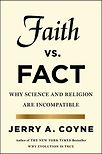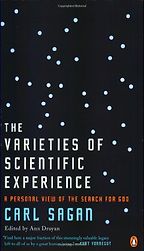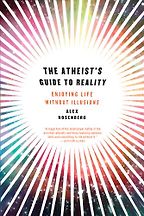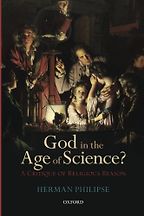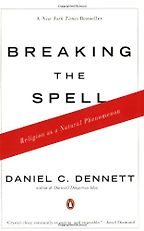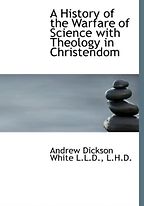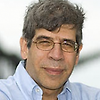You feel strongly that science and religion are incompatible, you’ve even written a book about it, Faith Versus Fact. I can see why, in extreme cases, that might be so. For example, if the teaching of evolution in schools is being challenged, of course you, as an evolutionary biologist, will strongly object to that. But in less severe cases, when someone does believe in science and its conclusions, why does it matter to you if they also happen to believe in God?
My thesis is not that there are not science-friendly religious people or that there are not religious scientists, because there obviously are. You can espouse both of these things. Probably the majority of science-friendly believers in the US don’t directly attack science. Still, over 40% of Americans are young earth creationists, so religion coming into direct conflict with science is a lot more common than people think, at least in the sphere of creationism. That does threaten school children and we are constantly fighting these battles.
But most science — physics, chemistry and archaeology — doesn’t really bother religious people. My argument is not that religious people are constantly battling science or trying to prevent it moving forward, but that the methods that religion uses to ascertain truths about the universe are at odds with the methods that science uses. They’re in competition with each other. Theologians will also admit this, unless they’re dissimulating. Religion doesn’t have a reliable way to discern truth and this is the real conflict. It’s a conflict of methodology, it’s a conflict of philosophy, and, ultimately, it’s a conflict of outcomes.
“The more the universe seems comprehensible, the more it seems pointless.”
I don’t care if a religious person accepts science and practises their own private faith. The problem is that this acceptance of faith — which means belief without substantial evidence — as a useful means to ascertain truth has invidious social consequences. In my country, it’s opposition to abortion, it’s opposition to gay marriage. Creationism is the least of our worries. It’s this enabling of faith, this untoward respect for belief without evidence, that has caused so much mischief. If religious people just kept to themselves, just went to church, respected the findings of science and a) didn’t teach it to their kids (which I think is a form of child mistreatment) and b) didn’t try to take their religious beliefs into the public sphere and make them law for everybody else, than I wouldn’t care so much. But that’s not the way it is. Certainly not in Muslim countries, where religion and government are almost synonymous. It is a widespread problem.
But we do now have experience of atheistic societies. I’m thinking of the Soviet Union and post-1949 China, both of which rejected religion and claimed to be scientifically-based societies. If you take faith out of the picture, don’t other crazy schemes emerge? Is it really religion that is a danger to science and society or is it human beings that are a danger to science and society?
The problem with the Soviet Union and China is that religion was replaced by an ideology which was largely anti-science and certainly anti-rational. In Russia, under Stalin, the cult of the leader replaced religious belief. That’s why they didn’t like religion, because it displaced people’s affections for the leader. It was in the Soviet Union that Lysenkoism, which is explicitly anti-scientific, took over and ruined Russian genetics for 30 years. I’m not as knowledgeable about China but we know there wasalso a cult of leadership there. But I don’t think it is necessary that if you get rid of religion some other superstition or ideology is going to rush in and replace it. I have faith — and I use the term in the sense of ‘confidence in’ — that ultimately people will realize that the Enlightenment project, the project of using rationality to guide your actions, is the way to bring society forward. My book is about religions versus science, but that’s really a battle in the greater war between superstition and rationality. And now, of course, China has become a lot more science-friendly than it was 20 years ago. They send their students to the US to get knowledge, they’ve founded genomics institutes. The ideology has been ratcheted down a lot.
As Steven Weinberg said, there’s something about religion that brings out the worst in people. I think it’s partly the moral code — which is inherent in almost all the Abrahamic religions — which science doesn’t have. In science, you say, ‘Here’s what we found’ — but there’s no stricture, no ‘OK this is what you’ve got to do with it.’ That’s where people come in — and you get bad people using science to make atomic bombs etc. That’s not part of science itself, that’s just human personality. It’s partly that religion has belief in absolute truth, which science also doesn’t. Finally, in many religions, there is a system of eternal punishments and rewards. If you combine those three toxic aspects you get people doing stuff they wouldn’t be doing if there wasn’t religion. If there wasn’t Catholicism, would we have the demonization of gays in the US? Would we have all this opposition to abortion? Look at Ireland — where abortion is illegal and women die because the fetus gets stuck and blasphemy is still against the law. Imagine Ireland without religion. Would those things still exist? I don’t think so. And you can say — which I suppose is what you are saying — that something else would rush in to fill the gap and we’d still hate gay people and restrict abortions. But I’m not so sure about that. Certainly that hasn’t happened in northern Europe.
But is it so beneficial to science if societies are non-religious? These ultra-rational northern European societies that you’re describing, are they producing more scientists than the US with its young earth creationists or the UK with its religion-heavy elitist education system?
I think you’re misunderstanding my argument. It’s not that if you get rid of religion, science is going to suddenly burgeon. What will burgeon is rationality, and science is a product of that. Certainly the Netherlands, Denmark and Sweden produce their share of scientists. The Nobel Prize comes from Sweden, Denmark produced Niels Bohr. A lot of great science has come out of these countries since they became secular. I don’t know the data, but in terms of a per capita rate, I’m not sure you can say they’re worse off than the US and the UK. They’re small countries. You can’t say they’re markedly inferior the way that Saudi Arabia is, which has never produced a Nobel Laureate in science at all.
Let’s go through the books you’ve chosen. The first one is The Varieties of Scientific Experience by Carl Sagan, who was an astronomer and great popularizer of cosmology in the United States. Tell me why you’ve picked this one.
Of all these books, this is the one that resonates most for me. It was edited by his wife and published in 2006. It’s a distillation of the Gifford Lectures, a very prestigious series of lectures given in Scotland, endowed to give famous people a chance to talk about natural theology i.e. the relationship between science and religion. They’ve been going more than 100 years by now and they gave rise to William James’s The Varieties of Religious Experience, a very famous book. Sagan was a Gifford lecturer in 1985 and he titled his book after James’s. It’s a reflection, at the end of his life, on the dangers of superstition and of faith. It’s very well written and a lot more succinct than his more popular book, The Demon Haunted World: Science as a Candle in the Dark which was a big bestseller in the US. That’s a bit bloated. This book is much more concise, much more tightly argued. It makes a good case for basing your actions on rationality rather than superstition and he talks about the dangers of not doing so from his experiences in fighting medical quackery, UFOs, the purported existence of canals on Mars etc.
Get the weekly Five Books newsletter
The reason I like the book is that he makes a lot of good points. First of all, he maintains that pseudosciences — and he includes religion in that — have to be judged as sciences, because they make empirical claims about reality. That’s a claim that most religious people instinctively reject. Shelley was the first person to say that God is a hypothesis, therefore believers should be forced to give evidence for it. This is more or less Sagan’s view. Second, he shows that the way pseudoscientists insulate their beliefs from disconfirmation is very similar to the way religionists do. Sagan is often thought of as somebody who attacked pseudoscience but was friendly to religion. If you read this book, you’ll see that he was not. It’s clear that he sees religion as just one of the many brands of irrationality he was fighting his whole life. He was a New Atheist before there were New Atheists.
He does seem to think it’s more likely there are aliens than that there’s a God.
A lot of people do. Because aliens are naturalistic phenomena whereas gods are supernatural and we don’t have evidence for anything supernatural. Sagan was involved in the SETI project to detect alien life. He was unsuccessful, but if I had to put my money on either, ‘Is there life somewhere else in the universe?’ or ‘Is there a supernatural being?’ I’d definitely bet on the former. It is likely that there are other forms of life somewhere.
When you read the book, you feel very small. It almost seems as if the history of scientific discovery has been about finding out human beings are nothing special. It starts with Copernicus — we’re not at the center of the universe — and it just gets worse and worse.
Yes, but on the other side is his famous pale blue dot speech: we’re a lonely spot in the universe and so we have to take care of it and take care of each other. He wasn’t doing down humanity, he was just trying to give us some perspective. It’s not so much that humans are worthless, but that that the universe is large and there’s many mysteries to be discovered. That, in itself, is worthy of awe.
Let’s go on to the next book, Alex Rosenberg’s An Atheist’s Guide to Reality. I found this book really, really interesting. He’s explaining what current science says about the reality around us. And a lot of these things I had no idea about.
Like what? What he says about free will?
Yes, and also the physics. I had no idea about the second law of thermodynamics, or that we’re made of fermions and bosons. I take it that none of this is surprising or controversial to a scientist?
Some of it is and some of it isn’t. The main point he makes, that we are material objects and have to obey the laws of physics, is uncontroversial. It’s also uncontroversial among scientists and philosophers that the form of libertarian free will — and this is something I’m deeply involved with right now — that people think they have, where we are conscious agents that can make choice A or choice B if we want to, is simply insupportable. The only people who really believe that are people who a) haven’t thought much about it — and that’s a lot of people or b) religious people who have this dualistic view that there is something more to your behavior and your choices than the laws of physics.
So what I wanted to ask you in the context of this complete lack of free will is the following: Why do I bother to think about anything at all if I’m just a robot? Why don’t I just check out completely?
There’s two aspects to what you’ve just asked. First of all, that this kind of determinism causes nihilism and lassitude. The answer is that it doesn’t, because we cannot overcome our feeling that we’re agents. Even if you think about it, even if you truly, deeply realize it, you still go ahead and act like you act, because we’re programmed like that by evolution. Which is the second part of the question, why don’t I just stay in bed all day or walk around like a robot? It’s because evolution has made you think you’re an agent. Which leads to a very interesting question. Why do we have this false sense of being able to choose, when we don’t really have it? We don’t know. There are several explanations I could give you for why we have this false sense of agency, this illusion of free will…
Are you sure we don’t have it?
I can explain it to you in one second why we don’t, and it’s this: our brains are made of molecules. Molecules obey the laws of physics therefore everything that comes out of our brain, including our behaviors and choices, must obey the laws of physics. Therefore, in so far as those laws apply, everything we do is basically determined. It may be determined on a macro-level or fundamentally indeterminate on a quantum level but we cannot affect how our brains work by thinking about it, because even our thinking is physically-based. So that means we can’t make a choice. If you were to go back to last night, when you were drinking wine, you didn’t have a choice how many glasses you had. It could have been predicted in advance by the circumstances of nature. People hate that, they really hate it. That’s one reason Alex’s book has received a lot of scorn and dislike, because it basically speaks the truth. We are physical automatons. And there are good things about that. Determinism does have some beneficial social consequences.
Like what?
Right now we have the trial of Dzhokhar Tsarnaev in Boston, they’ve been weighing up whether or not to kill him because of the Boston Marathon bombing. They’re trying to judge whether or not he had a choice to do what he did and the defense are saying, “Well, he was influenced by his brother.” It’s as if the more choice he had, the guiltier he is. If he had some kind of brain disease, or if he was under the sway of his brother, then maybe he should just be sent to prison for life. The problem is that none of this is true. He didn’t have a choice about what he did, no matter what the situation was. It was the result of his genes and his environment. Therefore, and Alex talks about this, you shouldn’t punish someone based on the false assumption that they can choose to do good or bad, because they can’t. You can only do one thing at any one time in your life and if that’s bad, that’s not because you made the choice to be bad. It’s because all your environmental and genetic history impinged on you to behave in this way at that time. That has enormous consequences for how we treat people, for punishment and reward, as well as how we regard our own lives. Our feelings of sorrow (I should have behaved this way!) will all vanish, as well as invidious social consequences like the theory that people are poor because they deserve it, or that people get what they deserve in this life. That’s the basis for conservative politics. And it’s all wrong. People don’t get what they deserve, they get what they get because of the laws of physics.
In his view, it doesn’t seem to be so much religion that’s the problem as the human brain. It’s not designed to perceive reality, but rather to listen to stories. He seems to view the humanities as almost as bad religion in that regard. Science and physics, meanwhile, are almost too hard for our brains to grasp.
Physics is hard. I find myself struggling with popular books on physics like Brian Greene’s all the time, and, as we all know, Stephen Hawking’s first book is the best-selling least-read book of all time. But where I part company with Alex is where he dismisses the humanities as an illusion. On one level, he’s right. They are. But on another level, we live our lives as human beings and the humanities have an emotional effect on us. They can change the way we behave. We can weep when we hear symphonies, we get enormously moved when we read Tolstoy — or at least I do. That would be Anna Karenina, not War and Peace.
Is he saying they’re irrational?
He’s saying they’re an illusion. That doesn’t mean that something is false, it means it’s not what it seems to be. I don’t know exactly what he means when he says they’re “elaborations of an illusion.” That’s probably connected with his confusing discussion of thinking about things, and how we can’t really think about things. I won’t even get into that. But it’s raised the ire of a lot of non-scientists, to imply — and he may well believe this — that most of the humanities are of no consequence. He could have left that stuff out. The value of his book is in drawing out the consequences of naturalism, which generally I think he’s right about. It’s just that people don’t like it. People like to think they can make choices. They like to think that consciousness is something other than an illusion that comes from molecular interactions.
Also, we want to feel we’re here for a purpose.
Naturalism did away with that a long time ago. But it still hasn’t filtered down to the theologians. The Catholic theologian John Haught said that we can live with science, we can respect the findings of science, but that what religious people can’t abide is “the conviction that the universe and life is pointless.” And yet Steven Weinberg, who is an atheist and Nobel Prize winning physicist, has said that the more the universe seems comprehensible, the more it seems pointless. So there’s a real clash there between science and religion that cannot be overcome, even if you’re a science-friendly believer.
So many scientists are skeptical about religion, but you do hear it said that some of the greatest scientists of all time have been believers. Like Isaac Newton, though I suppose we can dismiss him as he also believed in alchemy. But didn’t Stephen Hawking refer to the knowing mind of God in his Brief History of Time?
Nearly all scientists of the 18th and 19th centuries were believers, but only because everyone was a believer then — or at least had to pretend that they were believers. And yes, as I said at the beginning, there are still a substantial number of religious scientists. But the more accomplished scientists tend to be atheistic. For example, only 7% of the members of the prestigious U.S. National Academy of Sciences believe in God. As for Hawking specifically, it’s clear he used the word ‘God’ as a loose metaphor for the laws of physics. To quote him on this: “What I meant by ‘we would know the mind of God’ is, we would know everything that God would know, if there were a God. Which there isn’t. I’m an atheist.” That pretty much settles the issue. But believers still like to argue for comity between science and faith by citing famous scientists who are thought to have believed in God. Einstein, by the way, was almost certainly a nonbeliever as well. As I show in my book, he stated repeatedly and explicitly that he didn’t accept a personal God, and saw all religions as manmade.
So next on your list is the book by a Dutchman, Herman Philipse, God in the Age of Science? A Critique of Religious Reason. In your email you mentioned this book was academic but “important.”
Theology is basically a warped form of philosophy. I’ll get in trouble for saying it, but it’s a fact. Theology is the kind of philosophy that’s applied to a non-existent object. So they use all the tools of philosophy. If you read sophisticated theology there’s even Bayesian analysis and mathematical logic in there. So it looks like philosophy but it all applies to a meaningless question involving a non-existent being. Philipse is a philosopher so he’s well equipped to deal with this. In particular, he goes after Richard Swinburne, who is probably the greatest living philosopher of religion and is a theist.
“Theology is a warped form of philosophy.”
Philipse looks at the so-called philosophical academic arguments for God and just rips them apart. He’s really smart, he knows the game and he applies the methods of philosophy to questions like the problem of evil. Why is there moral evil in the world? Why is there non-moral evil, like earthquakes and tsunamis? How do theologians answer this? Here are the answers and here’s what’s wrong with them. That’s one of the many things he does. He shows that religion is not only irrational but it’s incoherent. In the first part of the book he shows how people’s concept of God is so incoherent that he could basically stop the book right there and conclude there’s nothing to talk about. People can’t even define God. And to a large extent he’s right. I found the book hard slogging, as you probably did too, but, at the end, when the dust has settled, I don’t think any sophisticated defence of religious arguments remains credible.
And he’s focusing on Swinburne because he’s the best?
You have to realize what people like me — who are going after theology because of its scientific and logical problems — face. It’s always the same argument, which is, “You haven’t dealt with the most sophisticated forms of belief, the most sophisticated theology! You have to read Swinburne, you have to read Karen Armstrong, you have to read David Bentley Hart!” So, for the past two-and-a-half years, that’s what I did. And one of the most rarefied of all the sophisticated theologians is Swinburne, so if you can take his arguments apart then nothing much is really left standing. He’s the sine qua non of theologians. But Philipse also goes after others — Alvin Plantinga, who is one of America’s most respected religious philosophers. In a way I see Philipse as the spiritual — if I can use that word — heir of Walter Kaufmann, who was a philosopher at Princeton and wrote much more accessibly. He was an atheist philosopher, but he wrote several great books on why theology is a useless endeavor. I wanted to recommend one of those, but he was going after theology as a whole, and my brief was to talk about religion and science…
If God doesn’t exist, it’s depressing to think of all those theologians spending thousands and thousands of hours writing about religion down the ages. If they’d used all their energy and insights on science we’d probably have a cure for cancer by now.
These guys are not dumb, most of them. They are PhDs with smart brains. It’s just a shame that they apply all that brainpower to rationalizing their emotional commitments. They could have been scientists or archaeologists or even writers. Somebody that actually contributes something. To me, even a great novel is a much more worthwhile accomplishment than anything theological, because theology pretends it’s about reality whereas in novels you suspend disbelief from the very beginning. You get immersed in a world which you know is fictional but from which you can still get emotional satisfaction. With religion you’re immersed in a world which is supposed to be real.
Book number four on your list is Daniel Dennett’s Breaking the Spell. He’s urging that religion be studied scientifically, which he argues hasn’t been done enough.
He calls it Breaking the Spell for a reason. He thinks there is this sanctity about religion which prevents people from asking, ‘Where did it come from in the first place?’ It’s a human construct, after all, it wasn’t given to humanity by God. It couldn’t have been, because we have thousands of different religions. So even religious people recognize the human contribution to religion. At the beginning of the book, he says it could be real. We could be worshipping a real divine being. But we still want to know where this system of beliefs and practices and ceremonies came from — and it’s not off limits. That’s the importance to me of that book.
He’s trying to be open-minded.
Yes, and one of the reasons Dan is not as vilified as people like Christopher Hitchens or Richard Dawkins or Sam Harris, is because he seems nicer. But his mask sort of slips in the second half of the book. He moves from saying, ‘Let’s study religion objectively as a human construct and there might be something behind it’ to ‘We’re studying it as a human construct and we know there’s nothing behind it.’ That’s OK with me, because I agree with him.
He also tries to be open-minded about the effects of religion. He says we need to study it before we can see whether its influence on society is good or bad.
I think at the time he wrote the book that might have been true. I don’t want to put words in his mouth but I know Dan pretty well and I’m pretty sure that he thinks religion is inimical to human society. Most of his activities now are spent showing how this is true.
For you, as an evolutionary biologist, what is the most convincing explanation for why religion is around so much?
As a scientist what I should say is that we don’t know because it arose in the irrecoverable mists of time and we weren’t there. But I can give you my theories of what I find most appealing. First of all, a lot of religion is inherited, because you teach it to your kids. So it spreads that way and you can make a phylogeny, or family tree, for religions like you can for species. You can see them breaking off from each other over time and spreading, with some going extinct. Of course that doesn’t explain its hegemony, it has to appeal to some aspect of the human psyche or we wouldn’t have it. That’s where the question comes in. I don’t know the answer, I have to emphasize that. Dawkins and others have said that humans are evolved to be credulous. When we’re children, it’s much more adaptive for us to listen to our elders than to go out and learn for ourselves. Your parents can say, “Stay away from that lion there,” and if you believe that and listen to them, you’re a lot better off than if you go out and investigate what that lion is yourself. That kind of killing off of people who don’t listen to experience will select for a mindset or brain in which you are conditioned to believe those people that are older and wiser than you are. To me, that seems to play an important role in religion. It co-opts an evolved trait we have to pay attention to what our parents tell us. And, of course, your parents teach you religion. Religion also appeals to the communality of people, their desire to get together. It gives them a sense of security, of community — that may account for it, certainly some people say it does.
Pascal Boyer’s theory is that we have an agent-detecting device. This is where Dennett begins his own explanation — that we are evolved to see agency in nature. If a leaf rustles, we’re better off thinking that there’s some animal out there, than saying, “Oh, it’s just the wind.” Because if you think there’s an animal out there, you’re much more likely to live than if you think it’s just the wind and it turns out to be an animal. So we have an agent-detecting device, we see agents wherever we live in nature, at least in our early infantile aspect of humanity. That somehow, in Dan’s account, turns into a theory of the supernatural. I’m not sure I agree with him. There are many, many of these theories and all of these things may play together. Another one is the belief in the afterlife. I don’t want to die. Nobody wants to die. If you give a promise that you’re going to live for eternity in good circumstances, that’s a powerful impetus to believe. Of course there are some religions, like the one I used to have as a Jew, that don’t believe in an afterlife, so that can’t be all of it. As a scientist all I can say is that the origin of religion is an interesting but unsolved question. Dan has opened it up to introspection but I don’t think we’re ever going to know the ultimate reason why humans are religious.
Isn’t he saying we need to know why humans are religious if we’re going to deal with religion?
That’s one of the motivations for his book. It purports to be a study of that, but the problem is he doesn’t answer this question. He says he’s going to try but then he winds up saying there’s all these theories and we just don’t know. That’s fine, because he’s right. We don’t know. But on that journey, there are other things about religion that you can learn about. Where do people get their beliefs from? That’s something that we can answer logically: They get them from their parents, from their milieu. Why is it in their interests to have these beliefs? These are questions that we can investigate in the here and now and we can answer them. And that has great import for society. Right now, one of our big pressing problems is Muslims who want to impose theocracies on western democracies and who turn violent if they see a cartoon of Mohammed. You can investigate why that is. I think you need to do that if you’re going to combat this kind of theocratic mentality, which I see as directly opposed not just to science, but to rationality and democracy. You need to understand where it comes from. That’s something that we can do. The refusal of western leaders to recognize that religion is behind a lot of this stuff — saying it’s due to political oppression, or disenfranchisement or it’s our fault ultimately — is a real block in trying to do anything about the problem, because we refuse to admit one of the obvious causes which is religious belief.
What discipline should be doing this studying?
There are analysts in sociology. The problem is if you go into Saudi Arabia and ask people what they believe, they’ll kill you. Look at the Pew study which studied the attitudes of Muslims around the world by asking them questions. Do you think Sharia law should be imposed? Do you favour stoning for adulterers? Do you favour the death penalty for apostates? The results, by the way, were very depressing because even in western countries a substantial fraction of Muslims favoured these oppressive practices. But the countries that weren’t surveyed were countries like Yemen, Saudi Arabia and Qatar, because they weren’t even allowed to go in there and ask those questions. Even asking people what they believe is regarded as a form of dissing religion.
Let’s go on to your last book, which dates from the late 19th century. The author, Andrew Dickson White, helped Ezra Cornell to set up a university with the idea that it would not be defined along political or religious lines, is that right?
He wanted to model it on the European system, which by that time had become secular. Universities were originally, in the Middle Ages, religious institutions. Dickson White and Cornell agreed that they were going to make this university secular because only by insulating universities from the influence of religion could there be free inquiry. And he’s absolutely right about that. They put a clause in the statement of the founding of Cornell — which was given a grant by the state of New York — that there would be no test for religious belief for professors. You could be an atheist and still be a professor. That really caused a lot of problems, to the extent that they almost refused to let the university be set up. Some people even said you should be required to be a preacher in order to become a professor. Dickson White stood his ground and won, with the result that Cornell is a purely secular institution. It’s one of the few really high-class American universities that doesn’t have a school of theology.
“Accepting faith as a means to ascertain truth has invidious social consequences.”
Dickson White was a believer, by the way. He says he’s a Christian and that by writing this book, he is furthering religion. In his view, it was the dogmatism of religion that was inimical to science, not religion per se. People misunderstand what he was trying to do. His purpose was not to impugn religion, but to show that it’s the dogmatism of religion that prevents social progress and here’s examples of that dogmatism. And then the book became too long…he spent 30 years on it…
Yes, he launches the book with an example of how the fact early Christians attributed disease to diabolic influence was prejudicial to the development of medicine. Then I presume he takes it on from there, going through history, coming up with examples?
More or less. He covers almost everything: anesthesia, lightning rods, vaccinations and he winds up with Biblical scholarship, showing that at every step of the way, representatives of the church were opposed to this stuff. We can talk about some of the criticisms of this book. It’s in really bad odour amongst philosophers and historians of science because it takes such a strong stance, but also because they perceive errors in it. He also argues that attributing mental illness to demonic possession inhibited science. That’s a whiggish view of the history of science because back then we didn’t have any science. What else could we do, except use our knowledge the best we could, to explain why people were behaving oddly? It was only when science began to develop that religion could impede it. It’s not clear to me whether the Church itself actually impeded the development of science, or was neutral. Some people say Catholicism actually helped science. I don’t know the answer because we can’t rerun the tape of history. What is clear — and I think this is the point that White makes that people miss — is that once science got going, once people wanted to study naturalistic explanations for phenomena, many representatives of the Church fought it, and impeded that effort. But he does get stuff wrong. There is evolution stuff he gets wrong.
But clearly he does think religion and science are compatible.
Yes, as long as the religion is not what he calls “dogmatic religion.” He would take the Stephen J Gould attitude that non-dogmatic religion is religion that doesn’t make any statements about reality. Gould said that in his 1999 book, Rocks of Ages, and people loved that book. Here’s a famous atheist coming out and saying, “There’s a proper sphere for religion and there’s a proper sphere for science and they don’t overlap. Isn’t that great? We can all be friends.” I think that’s White’s attitude as well, the idea of these ‘non-overlapping magisteria’. The problem is it only works if you have a view of religion as something that does not make dogmatic statements about reality, and unfortunately most religions aren’t like that. Creationism is one example of how religions regularly violate their supposed stricture to stay out of science because they make statements about how life began, about when it began, etc.
From what you’ve been saying it seems as if you would be comfortable with religion if it stuck to fairly narrow stuff. But really you would prefer everybody to be an atheist, am I correct?
That’s a pretty strong statement if I say yes to that. Let me put it this way. I would prefer a world in which people base their beliefs on facts rather than faith (which is why I called my book that) and do not make dogmatic statements about reality based on no evidence, little evidence, or even counter-evidence. That world is the one that is instantiated in the Netherlands, in Denmark and in Sweden and the results are great. Most people in those countries are atheists and yet these countries are some of the most moral and pleasant places to live in the world. They take care of old people, they take care of sick people, they don’t demonize sexuality or smoking marijuana. They’re deeply empathic societies, and I’d like the United States to be like them.
If people had a form of religion that did not make statements about reality…and there are some religions like that: that worship nature, pantheism, or maybe Confucianism or some forms of Buddhism. You can call them religions, but there’s no God, there’s no belief in heaven or hell — though some Buddhists believe in rebirth which is not right. Religions that are non-religious I don’t mind so much.
Interview by Sophie Roell, Editor
May 20, 2015. Updated: December 1, 2023
Five Books aims to keep its book recommendations and interviews up to date. If you are the interviewee and would like to update your choice of books (or even just what you say about them) please email us at [email protected]
Five Books interviews are expensive to produce. If you've enjoyed this interview, please support us by donating a small amount.

